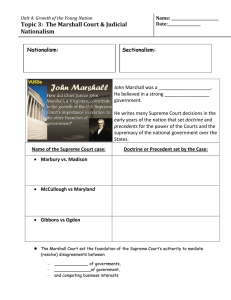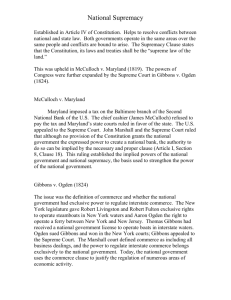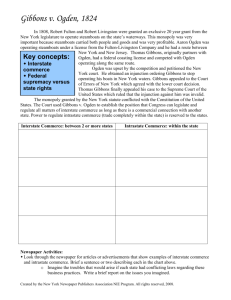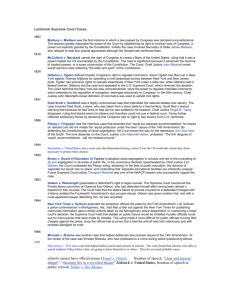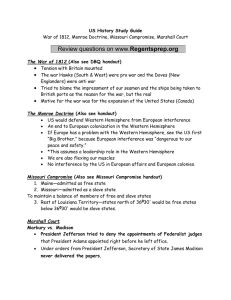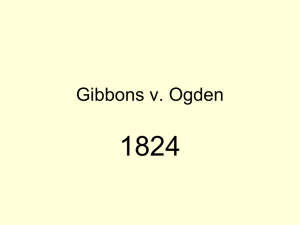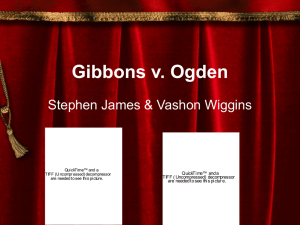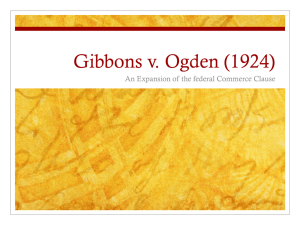Background Information Marbury
advertisement
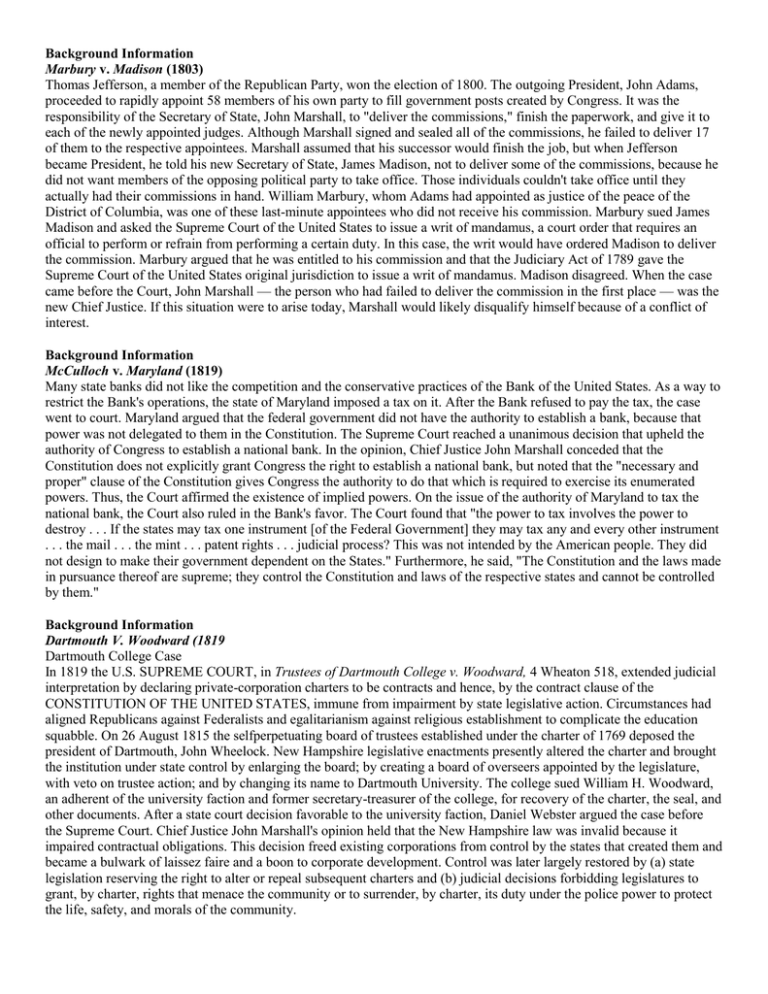
Background Information Marbury v. Madison (1803) Thomas Jefferson, a member of the Republican Party, won the election of 1800. The outgoing President, John Adams, proceeded to rapidly appoint 58 members of his own party to fill government posts created by Congress. It was the responsibility of the Secretary of State, John Marshall, to "deliver the commissions," finish the paperwork, and give it to each of the newly appointed judges. Although Marshall signed and sealed all of the commissions, he failed to deliver 17 of them to the respective appointees. Marshall assumed that his successor would finish the job, but when Jefferson became President, he told his new Secretary of State, James Madison, not to deliver some of the commissions, because he did not want members of the opposing political party to take office. Those individuals couldn't take office until they actually had their commissions in hand. William Marbury, whom Adams had appointed as justice of the peace of the District of Columbia, was one of these last-minute appointees who did not receive his commission. Marbury sued James Madison and asked the Supreme Court of the United States to issue a writ of mandamus, a court order that requires an official to perform or refrain from performing a certain duty. In this case, the writ would have ordered Madison to deliver the commission. Marbury argued that he was entitled to his commission and that the Judiciary Act of 1789 gave the Supreme Court of the United States original jurisdiction to issue a writ of mandamus. Madison disagreed. When the case came before the Court, John Marshall — the person who had failed to deliver the commission in the first place — was the new Chief Justice. If this situation were to arise today, Marshall would likely disqualify himself because of a conflict of interest. Background Information McCulloch v. Maryland (1819) Many state banks did not like the competition and the conservative practices of the Bank of the United States. As a way to restrict the Bank's operations, the state of Maryland imposed a tax on it. After the Bank refused to pay the tax, the case went to court. Maryland argued that the federal government did not have the authority to establish a bank, because that power was not delegated to them in the Constitution. The Supreme Court reached a unanimous decision that upheld the authority of Congress to establish a national bank. In the opinion, Chief Justice John Marshall conceded that the Constitution does not explicitly grant Congress the right to establish a national bank, but noted that the "necessary and proper" clause of the Constitution gives Congress the authority to do that which is required to exercise its enumerated powers. Thus, the Court affirmed the existence of implied powers. On the issue of the authority of Maryland to tax the national bank, the Court also ruled in the Bank's favor. The Court found that "the power to tax involves the power to destroy . . . If the states may tax one instrument [of the Federal Government] they may tax any and every other instrument . . . the mail . . . the mint . . . patent rights . . . judicial process? This was not intended by the American people. They did not design to make their government dependent on the States." Furthermore, he said, "The Constitution and the laws made in pursuance thereof are supreme; they control the Constitution and laws of the respective states and cannot be controlled by them." Background Information Dartmouth V. Woodward (1819 Dartmouth College Case In 1819 the U.S. SUPREME COURT, in Trustees of Dartmouth College v. Woodward, 4 Wheaton 518, extended judicial interpretation by declaring private-corporation charters to be contracts and hence, by the contract clause of the CONSTITUTION OF THE UNITED STATES, immune from impairment by state legislative action. Circumstances had aligned Republicans against Federalists and egalitarianism against religious establishment to complicate the education squabble. On 26 August 1815 the selfperpetuating board of trustees established under the charter of 1769 deposed the president of Dartmouth, John Wheelock. New Hampshire legislative enactments presently altered the charter and brought the institution under state control by enlarging the board; by creating a board of overseers appointed by the legislature, with veto on trustee action; and by changing its name to Dartmouth University. The college sued William H. Woodward, an adherent of the university faction and former secretary-treasurer of the college, for recovery of the charter, the seal, and other documents. After a state court decision favorable to the university faction, Daniel Webster argued the case before the Supreme Court. Chief Justice John Marshall's opinion held that the New Hampshire law was invalid because it impaired contractual obligations. This decision freed existing corporations from control by the states that created them and became a bulwark of laissez faire and a boon to corporate development. Control was later largely restored by (a) state legislation reserving the right to alter or repeal subsequent charters and (b) judicial decisions forbidding legislatures to grant, by charter, rights that menace the community or to surrender, by charter, its duty under the police power to protect the life, safety, and morals of the community. Background Information Gibbons v. Ogden (1824) One of the enduring issues in American government is the proper balance of power between the national government and the state governments. This struggle for power was evident from the earliest days of American government and is the underlying issue in the case of Gibbons v. Ogden. In 1808, Robert Fulton and Robert Livingston were granted a monopoly from the New York state government to operate steamboats on the state's waters. This meant that only their steamboats could operate on the waterways of New York, including those bodies of water that stretched between states, called interstate waterways. This monopoly was very important because steamboat traffic, which carried both people and goods, was very profitable. Aaron Ogden held a Fulton-Livingston license to operate steamboats under this monopoly. He operated steamboats between New Jersey and New York. However, another man named Thomas Gibbons competed with Aaron Ogden on this same route. Gibbons did not have a Fulton-Livingston license, but instead had a federal (national) coasting license, granted under a 1793 act of Congress. Naturally, Aaron Ogden was upset about this competition because according to New York law, he should be the only person operating steamboats on this route. Ogden filed a complaint in the Court of Chancery of New York asking the court to stop Gibbons from operating his boats. Ogden claimed that the monopoly granted by New York was legal even though he operated on shared, interstate waters between New Jersey and New York. Ogden's lawyer said that states often passed laws on issues regarding interstate matters and that states should be able to share power with the national government on matters concerning interstate commerce or business. New York's monopoly, therefore, should be upheld. Gibbons' lawyer disagreed. He argued that the U.S. Constitution gave the national government, specifically Congress, the sole power over interstate commerce. Article I, Section 8 of the Constitution states that Congress has the power "[t]o regulate Commerce with foreign Nations, and among the several States. . . ." Gibbons' lawyer claimed that if the power over interstate commerce were shared between the national government and state governments, the result would be contradictory laws made by both governments that would harm business in the nation as a whole. The Court of Chancery of New York found in favor of Ogden and issued an order to restrict Gibbons from operating his boats. Gibbons appealed the case to the Court of Errors of New York, which affirmed the lower court's decision. Gibbons appealed the case to the Supreme Court of the United States. The key question in this case is who should have power to determine how interstate commerce is conducted: the state governments, the national government, or both. This as no small matter, as the nation's economic health was at stake. Before the U.S. Constitution was written, the states had most of the power to regulate commerce. Often they passed laws that harmed other states and the economy of the nation as a whole. For instance, many states taxed goods moving across state borders. Though many people acknowledged that these were destructive policies, they were reluctant to give too much power over commerce to the national government. The trick was to find a proper balance. Chief Justice John Marshall's decision in this case was a precedent for determining what that balance should be and has far-ranging effects to this day. Background Information Worcester V. Georgia (1832) In Worcester v. Georgia, 31 U.S. (6 Pet.) 515 (1832) the U.S. Supreme Court invalidated the conviction under a Georgia statute of a non-Cherokee man for the offence of living on the territory of the Cherokee Nation. The court held that the law under which he was convicted was ultra vires the State of Georgia. In so doing the court considered the nature and basis of the Cherokee claims to the land and to governance over that land. Again, it based its judgment on its analysis of the origins of those claims which, it held, lay in the relationship between the pre-existing rights of the "ancient possessors" of North America and the assertion of sovereignty by European nations (at pp. 542-43 and 559): America, separated from Europe by a wide ocean, was inhabited by a distinct people, divided into separate nations, independent of each other and of the rest of the world, having institutions of their own, and governing themselves by their own laws. It is difficult to comprehend the proposition, that the inhabitants of either quarter of the globe could have rightful original claims of dominion over the inhabitants of the other, or over the lands they occupied; or that the discovery of either by the other should give the discoverer rights in the country discovered, which annulled the pre-existing rights of its ancient possessors. After lying concealed for a series of ages, the enterprise of Europe, guided by nautical science, conducted some of her adventurous sons into this western world. They found it in possession of a people who had made small progress in agriculture or manufactures, and whose general employment was war, hunting, and fishing. Did these adventurers, by sailing along the coast, and occasionally landing on it, acquire for the several governments to whom they belonged, or by whom they were commissioned, a rightful property in the soil, from the Atlantic to the Pacific; or rightful dominion over the numerous people who occupied it? Or has nature, or the great Creator of all things, conferred these rights over hunters and fishermen, on agriculturists and manufacturers? But power, war, conquest, give rights, which, after possession, are conceded by the world; and which can never be controverter by those on whom they descend? We proceed, then, to the actual state of things, having glanced at their origin; because holding it in our recollection might shed some light on existing pretensions. . . .The Indian nations had always been considered as distinct, independent political communities, retaining their original natural rights, as the undisputed possessors of the soil, from time immemorial, with the single exception of that imposed by irresistible power, which excluded them from intercourse with any other European potentate than the first discoverer of the coast of the particular region claimed. [Emphasis added.] Marshall C.J.'s essential insight that the claims of the Cherokee must be analyzed in light of their pre-existing occupation and use of the land -- their "undisputed" possession of the soil "from time immemorial" -- is as relevant for the identification of the interests §35(1) was intended to protect as it was for the adjudication of Worcester's claim. In Johnson v. M`Intosh Marshall C.J., although he acknowledged the Proclamation of 1763 as one basis for recognition of Indian title, was nonetheless of opinion that the rights of Indians in the lands they traditionally occupied prior to European colonization both predated and survived the claims to sovereignty made by various European nations in the territories of the North American continent. The principle of discovery which justified these claims gave the ultimate title in the land in a particular area to the nation which had discovered and claimed it. In that respect at least the Indians' rights in the land were obviously diminished; but their rights of occupancy and possession remained unaffected.
